
Neu! were a West German krautrock band formed in Düsseldorf in 1971 by Klaus Dinger and Michael Rother following their departure from Kraftwerk. The group's albums were produced by Conny Plank, who has been regarded as the group's "hidden member". They released three albums in their initial incarnation—Neu! (1972), Neu! 2 (1973), and Neu! 75 (1975)—before disbanding in 1975. They briefly reunited in the mid-1980s.
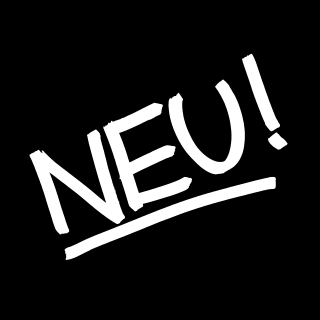
Neu! 75 is the third studio album by the krautrock band Neu!. It was recorded and mixed at Conny Plank's studio between December 1974 and January 1975. It was released in 1975 by Brain Records, and officially reissued on CD on 29 May 2001 by Astralwerks in the US and by Grönland Records in the UK.

Neu! 4 is the fourth and final studio album by krautrock band Neu!, released in October 1995. It was revised and re-released as Neu '86 in 2010.
La! Neu? were a German band founded by Klaus Dinger. After around 1985, Dinger had difficulty getting records released and distributed in Germany, but the Japanese record label Captain Trip Records signed him in 1994, setting up the Dingerland sub-label for Dinger's projects. La! Neu? is a loose collective of Dinger and (mostly) younger musicians, plus his mother Renate. Their records are recorded quite quickly and spontaneously, and the sleeve designs are usually by Dinger, with hastily handwritten liner notes and obvious glue drops.

Klaus Dinger was a German musician and songwriter most famous for his contributions to the seminal krautrock band Neu!. He was also the guitarist and chief songwriter of new wave group La Düsseldorf and briefly the percussionist of Kraftwerk.
La Düsseldorf was a German band, consisting of onetime Kraftwerk drummer and Neu! multi-instrumentalist Klaus Dinger and occasional Neu! collaborators Thomas Dinger and Hans Lampe. La Düsseldorf was formed after Neu! disbanded following the release of their Neu! '75 record. They released a string of successful albums during the late 1970s and early 1980s, and were considered highly influential by Brian Eno and David Bowie, with Bowie going so far as calling La Düsseldorf "the soundtrack of the eighties".
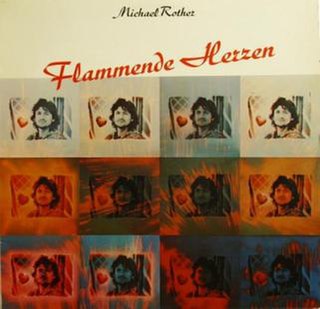
Flammende Herzen is the debut studio album by the German solo artist Michael Rother. It was released in 1977 and includes the single "Flammende Herzen" b/w "Karussell". The music was used the following year to soundtrack Flaming Hearts. It was Rother's first solo venture after having recorded five albums prior as a member of Neu! with Klaus Dinger and Harmonia with Hans-Joachim Roedelius and Dieter Moebius.

Néondian is a 1985 album by the German musician Klaus Dinger. Néondian was originally intended to be released as the fourth La Düsseldorf album, but the departure of Dinger's two bandmates in 1983 and the ensuing legal battle over the band's name forced Teldec to release the album under the obscure moniker "Klaus Dinger + Rheinita Bella Düsseldorf".

Die Engel des Herrn is a 1992 studio album by the band Die Engel des Herrn. It was originally released in a limited edition of 1000 on the private label L.S.D., which Klaus Dinger created when he failed to find a record label willing to release the album. When Dinger signed to Captain Trip Records in 1995 all copies of the album not yet sold were bought up and sold by CTR, although no more copies of the album were ever pressed. Consequently only 1000 copies of the album exist, and it is one of the rarest Klaus Dinger albums.

Düsseldorf is a 1996 album by the German band La! Neu?, recorded in the year following the band's formation in summer 1995. The album features several members of the Düsseldorf band Kreidler, and was recorded primarily in the city after which it is named. It was released during a period of intense musical activity for Klaus Dinger, who had just signed to the Japanese record label Captain Trip Records, which he used to market two previously unreleased Neu! albums. It is La! Neu?'s debut album, although of the musicians featured on it only Dinger and Victoria "Wicki" Wehrmeister would form a consistent part of the future La! Neu?

Zeeland is a studio album by German band La! Neu? recorded and released in 1997. It consists of a series of live jams recorded at Klaus Dinger's studio near Kamperland in the Dutch province of Zeeland. The album was produced and released quickly in comparison with its prequel Düsseldorf, which evolved over a period of two years. Zeeland was released on the Japanese record label Captain Trip Records, which released all of La! Neu?'s work.
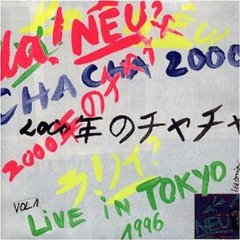
Cha Cha 2000 - Live in Tokyo 1996 Vol. 1 is a 1998 live album by the German group La! Neu?, recorded at a 1996 concert in Tokyo during the band's Japanese tour. The album consists of the second half of the 3½ hour concert, during which time the band played an extended 1¾ hour version of La Düsseldorf's 1978 song Cha Cha 2000. The album is regarded as the pinnacle of La! Neu?'s and Dinger's artistic achievements by many, and continues to be the best selling album released by Captain Trip Records.

Goldregen is the third album released in 1998 by German band La! Neu?. Like the previous year's Zeeland, Goldregen takes the form of a series of spontaneous jams, quickly recorded and mastered. Unlike Zeeland, Goldregen is entirely acoustic, containing only piano, violin, harmonium, drums and vocals. Unlike most other albums released by Klaus Dinger it is quiet and meditative rather than aggressive or abrasive; its low key and low-fi values arguable align it with ambient music.

Year of the Tiger is the sixth album released by German band La! Neu?. Like its sister-album Goldregen it was recorded and released relatively quickly in 1997-8. Unlike Goldregen – which featured only acoustic instruments – Year of the Tiger is predominantly electronic and beat-driven. The entire album is performed live on the CD Live at Kunsthalle Düsseldorf.

Live in Tokyo 1996 Vol. 2 is a 1999 live album by German band La! Neu?, recorded during their 1996 Japanese tour at a concert in Tokyo. Despite its title, the album actually consists of the first half of the concert, the second half having been released in 1998 as Cha Cha 2000 - Live in Tokyo 1996 Vol. 1. The album consists of a mixture of live improvisation and set songs, including some sampled material from English musician Mick Lount.
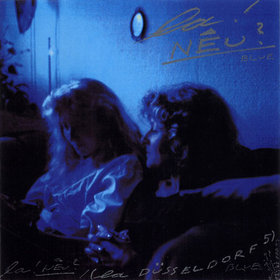
Blue is a 1999 studio album released under the La! Neu? name on Captain Trip Records. In most senses it is a Klaus Dinger solo album, as Dinger composed, produced, recorded and (mostly) performed the entire album alone. It was originally intended for release as the fifth La Düsseldorf album in 1987, but Dinger's contract with Virgin Records was terminated before the album's release. The 1987 rejection letter from Udo Lange is printed upside-down on the back cover of the CD.

Live at Kunsthalle Düsseldorf is a double-disc live album by German band La! Neu? released in 2001, after the band had split up. It consists of a recording of their final concert, held at Kunsthalle Düsseldorf on 19 July 1998. Immediately after the concert, the band disbanded amicably.

Japandorf is a 2013 album by Klaus Dinger and several other musicians, released under the name "Klaus Dinger + Japandorf" by Grönland Records. It was recorded in the year before Dinger's death on Good Friday 2008 and is the only one of three albums made since 1998 to have been released. It was originally intended to be released as a La Düsseldorf album, but this was blocked at the last minute by Hans Lampe, the band's original drummer.
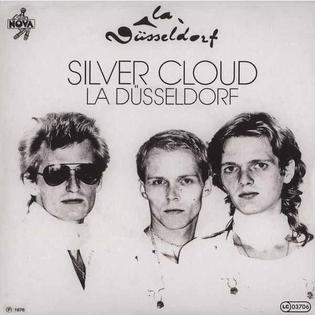
Silver Cloud is the debut single by German band La Düsseldorf, released in advance of their eponymous debut album. The single peaked at number 2 on the German music charts and made La Düsseldorf famous. Unusually for a high-charting single, "Silver Cloud" is entirely instrumental. The single continues to be popular, and was re-released on CD in 2008.

Crazy is a 2010 12" vinyl single by German band Neu!. It was released shortly after the Neu! Vinyl Box on Grönland Records as a part of Record Store Day. It was the first Neu! single to be released since Isi in 1975 and the only single to be taken from Neu! '86. It was sold in a limited edition and was only available for a short time after 17 April 2010.


















